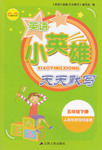题目内容
Without electricity human life ______ quite difficult today.
A. is B. will be
C. would have been D. would be
练习册系列答案
 英语小英雄天天默写系列答案
英语小英雄天天默写系列答案 暑假作业安徽少年儿童出版社系列答案
暑假作业安徽少年儿童出版社系列答案
相关题目
题目内容
Without electricity human life ______ quite difficult today.
A. is B. will be
C. would have been D. would be
 英语小英雄天天默写系列答案
英语小英雄天天默写系列答案 暑假作业安徽少年儿童出版社系列答案
暑假作业安徽少年儿童出版社系列答案